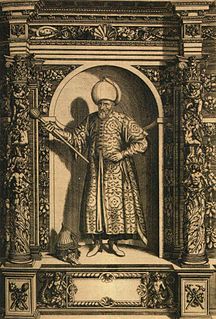This page is based on this
Wikipedia article Text is available under the
CC BY-SA 4.0 license; additional terms may apply.
Images, videos and audio are available under their respective licenses.
Muslims was a term used in the Socialist Federal Republic of Yugoslavia as an official designation of ethnicity for Slavic Muslims, thus clumping together a number of in actuality completely distinct ethnicities, among them most numerous being the Bosniaks of Bosnia and Herzegovina and Sandžak, along with smaller groups of different ethnicity, such as Gorani in Kosovo and Macedonian Muslims (Torbeši), but also in numerous cases even non-Slavic, such as Muslim Turks, Muslim Albanians and Muslim Bulgarians, whenever people perceived and expressed their religious identity superior to their ethnic background. Notably, "Muslims" from 1971 were one of the six constituent peoples in Socialist Federal Republic of Yugoslavia.
Muslim Slavs or Slavic Muslims are ethnic groups or sub-ethnic groups of Slavs who are followers of Islam. The term is most often used in study of Balkans. The majority of Slavic Muslims are found in Bosnia and Herzegovina, southern Serbia and south-west Bulgaria.

Islam is the most widespread religion in Bosnia and Herzegovina. It was introduced to the local population in the 15th and 16th centuries as a result of the Ottoman conquest of Bosnia and Herzegovina.
Muslims comprise the single largest religious community in Bosnia and Herzegovina (51%).

The dominant religion in Vojvodina is Orthodox Christianity, mainly represented by the Serbian Orthodox Church, while other important religions of the region are Catholic Christianity, Protestant Christianity, Islam, and Judaism.

Islam is the largest and majority religion in Sierra Leone. Based on the 2015 Pew Research Center research, 78℅ of Sierra Leone's population is Muslim. And also Based on the 2015 national census, 75℅ of Sierra Leone's population is Muslim last conducted a census in 2009 and estimates there are 4,059,000 Muslims in Sierra Leone.

Serbia has been traditionally a Christian country since the Christianization of Serbs by Clement of Ohrid and Saint Naum in the 9th century. The dominant confession is Eastern Orthodoxy of the Serbian Orthodox Church. During the Ottoman rule of the Balkans, Sunni Islam established itself in the territories of Serbia, mainly in southern regions of Raška and Preševo Valley, as well as in the disputed territory of Kosovo and Metohija.
The Catholic Church has roots in the country since the presence of Hungarians in Vojvodina, while Protestantism arrived in the 18th and 19th century with the settlement of Slovaks in Vojvodina.

While Orthodox Christianity is the dominant form of religion in Montenegro, there are also sizable numbers of adherents of both Islam and Catholic Christianity. The dominant Church is the Serbian Orthodox Church although traces of a forming Montenegrin Orthodox Church are present.

Islam spread to Serbia during the five centuries of Ottoman rule. The Muslims in Serbia are mostly ethnic Bosniaks, Albanians and minor but significant part of Roma people as well as members of the smaller ethnic groups Muslims by nationality and Gorani.
Bosniak - Bošnjak - may refer to:

The State Constitution of Bosnia and Herzegovina (BiH) and the entity Constitutions of the Federation of Bosnia and Herzegovina and the Republika Srpska provide for freedom of religion, and the Government generally respects this right in ethnically integrated areas or in areas where government officials are of the majority religion; the state-level Law on Religious Freedom also provides comprehensive rights to religious communities. However, local authorities sometimes restricted the right to worship of adherents of religious groups in areas where such persons are in the minority. 54% of Herzegovinian and Bosnian Muslims consider themselves as "just muslims".

In North Macedonia, the most common religion is Orthodox Christianity, practiced by most of the ethnic Macedonians. The vast majority of the Orthodox Christians in the country belong to the Macedonian Orthodox Church, which declared autocephaly from the Serbian Orthodox Church in 1967.
Muslims are adherents of Islam.

Arab Muslims are adherents of Islam who identify linguistically, culturally, and genealogically as Arabs. Arab Muslims greatly outnumber other ethnic groups in the Middle East and North Africa.
Bosnians are referred to as members of the general population of Bosnia, one of two main regions of Bosnia and Herzegovina. As a common demonym, the term Bosnians refers to the entire population of the region, regardless of any ethnic or religious affiliation. It can also be used as a designation for anyone who is descended from the region of Bosnia. Also, a Bosnian can be anyone who holds citizenship of the state of Bosnia and Herzegovina and thus is largely synonymous with the all-encompassing national demonym Bosnians and Herzegovinians. This includes, but is not limited to, members of the constituent ethnic groups of Bosnia and Herzegovina: Bosniaks, Serbs, and Croats. Those who reside in the smaller geographical region of Herzegovina usually prefer to identify as Herzegovinians.
Christianity is the predominant religion in Serbia. The Constitution of Serbia defines it as a secular state with guaranteed religious freedom. Eastern Orthodox Christians with 6,079,396 comprise 84.5% of country's population. The Serbian Orthodox Church is the largest and traditional church of the country, adherents of which are overwhelmingly Serbs. Other Orthodox Christian communities in Serbia include Montenegrins, Romanians, Vlachs, Macedonians and Bulgarians.

The term Serb Muslims refers to ethnic Serbs who are Muslims by their religious affiliation. Since it is defined by ethnicity and religion, term Serb Muslims should not be confused with term Serbian Muslims that refers generally to all adherents of Islam in Serbia, regardless of their ethnicity.
The term Yugoslav Muslims may refer to











